Unit 1 Wise men in history 课件
文档属性
| 名称 | Unit 1 Wise men in history 课件 | 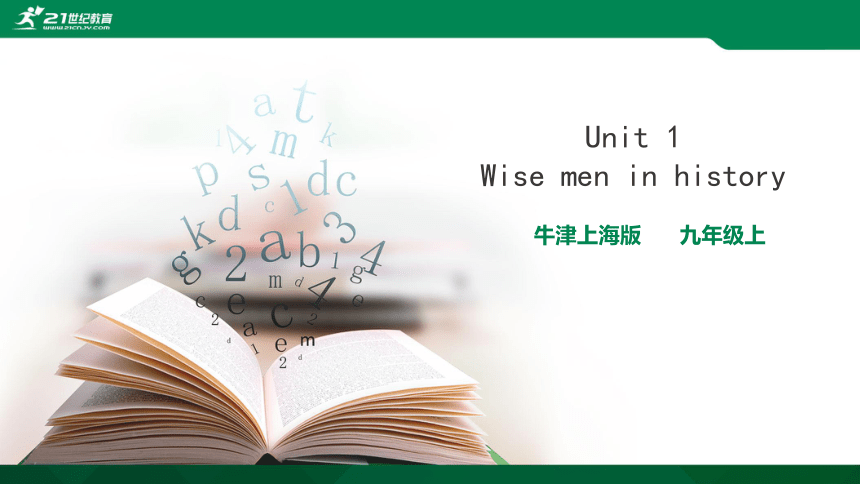 | |
| 格式 | zip | ||
| 文件大小 | 3.6MB | ||
| 资源类型 | 试卷 | ||
| 版本资源 | 牛津深圳版 | ||
| 科目 | 英语 | ||
| 更新时间 | 2019-06-03 11:33:53 | ||
图片预览


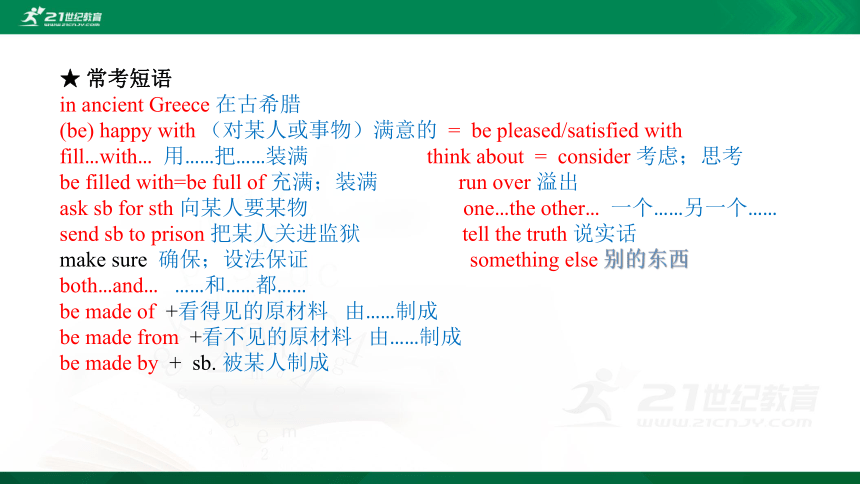
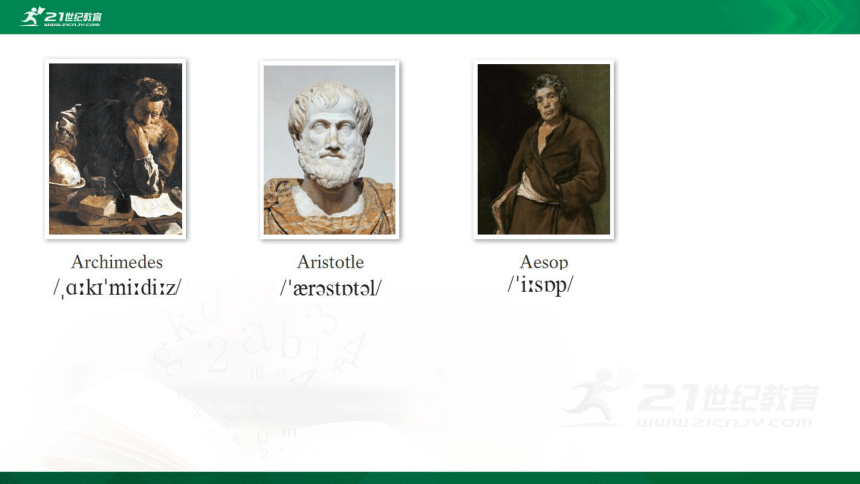
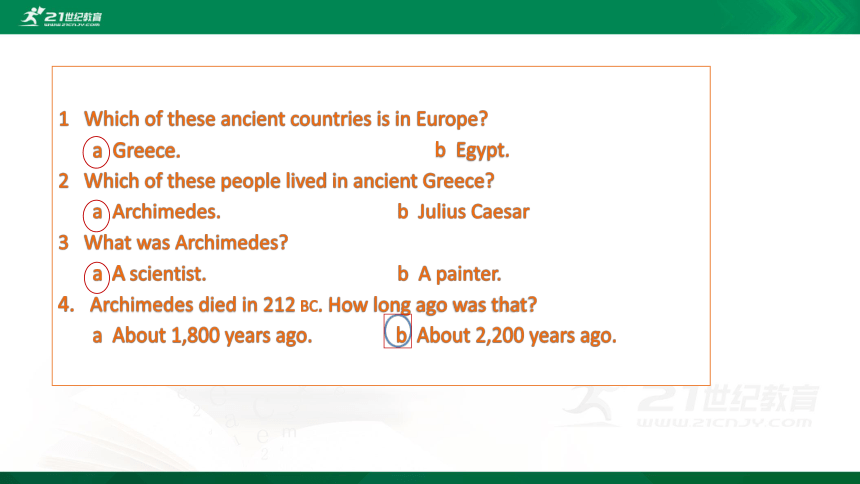
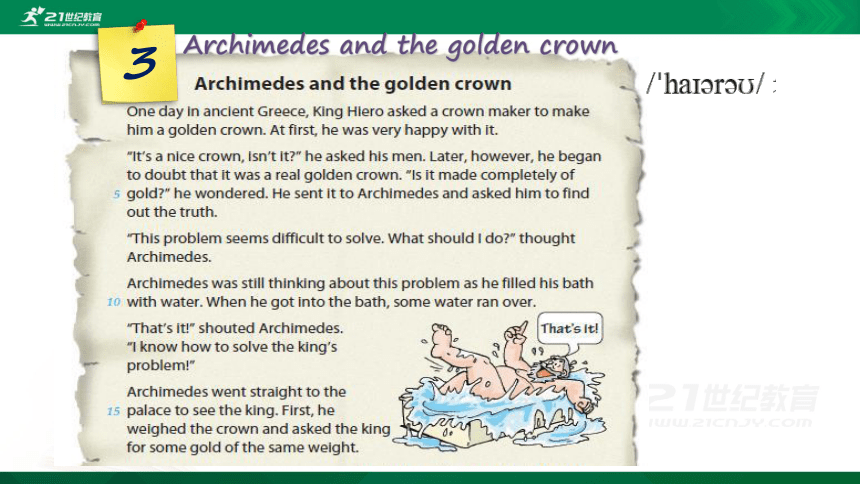
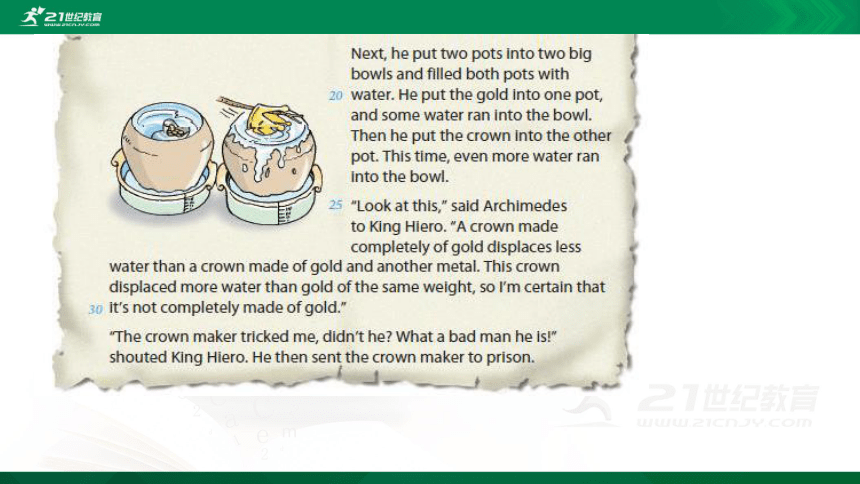
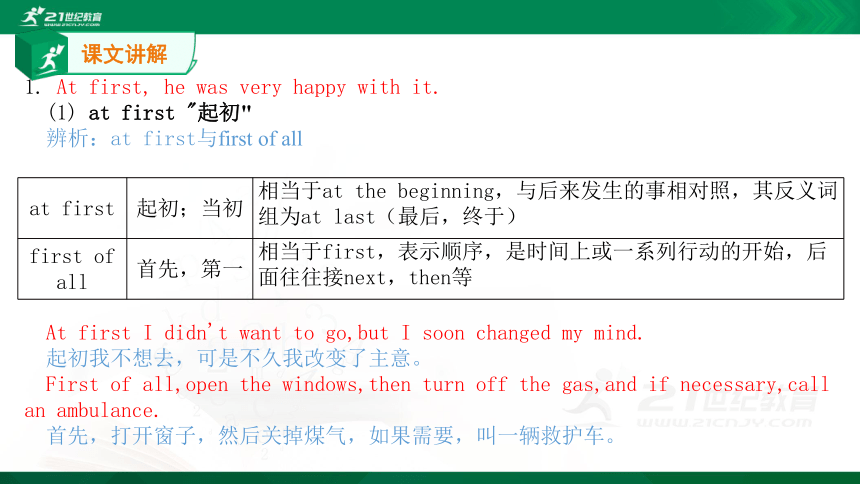
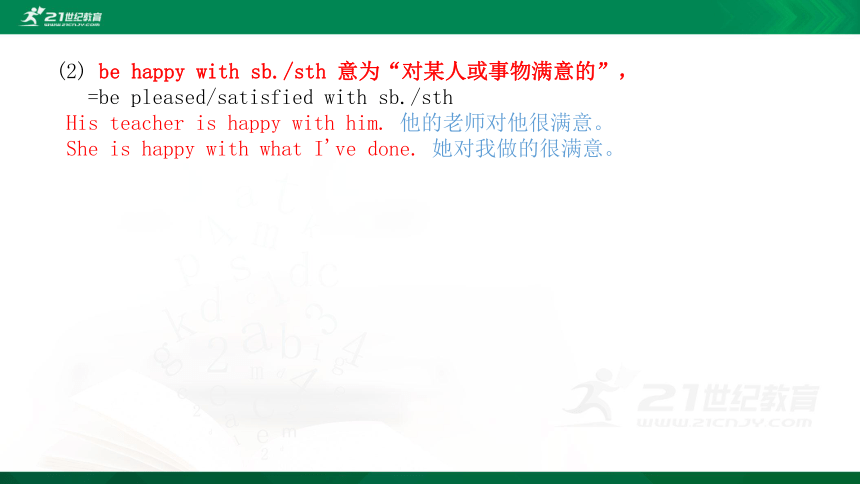
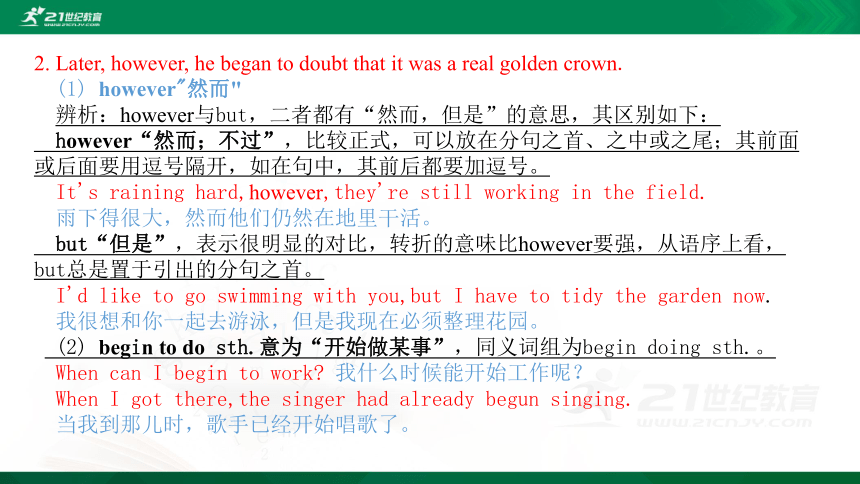
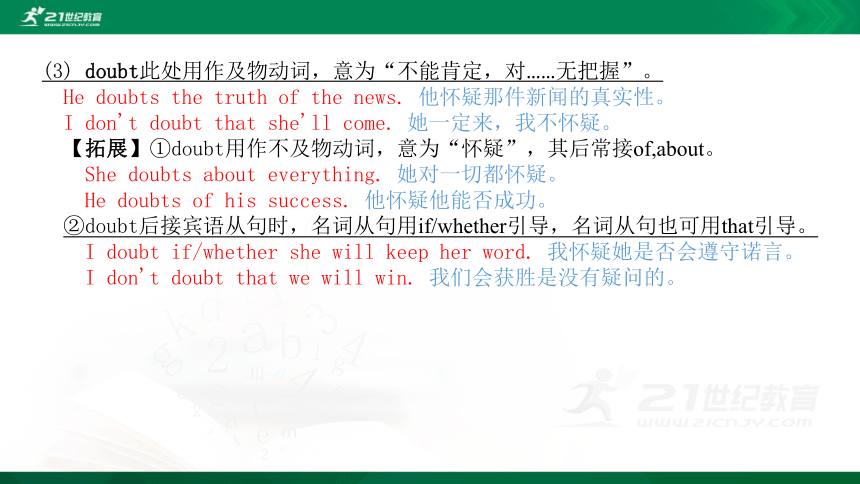
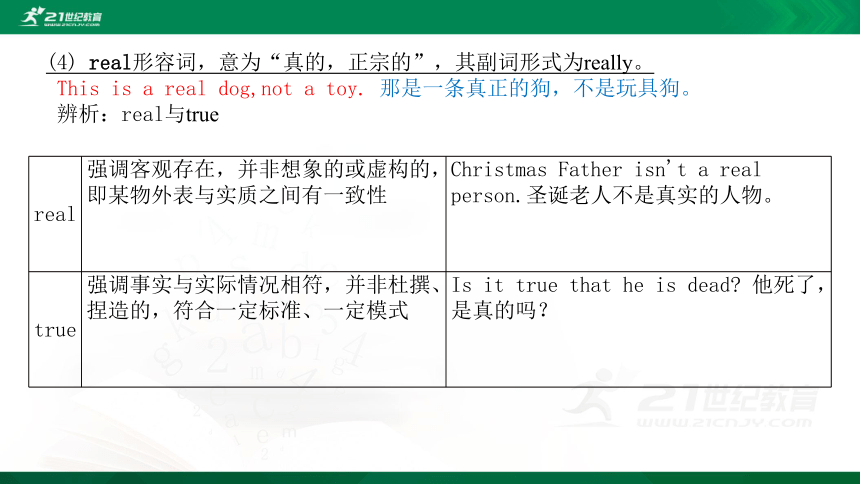
文档简介
Unit 1
Wise men in history
牛津上海版 九年级上
★ 必记单词
golden adj. 金的;金色的 Olympics n. [pl.]奥运会
agreement n. 同意;应允 pot n. 罐
doubt v. 不能肯定;对……没把握 real adj. 真的;正宗的
truth n. 真相;实情 seem v. 好像;似乎
solve v. 解决;处理 fill v. 装满;注满
bowl n. 碗;盆 brave adj. 勇敢的;无畏的
metal n. 金属 certain adj. 确定的;肯定的
prison n. 监狱;牢狱 hit v. (hit,hit)(用手或器具)击;打
correct adj. 准确无误的;正确的 mistake n. 错误
less det.(与不可数名词连用)较少的;更少的
知识要点
★ 常考短语
in ancient Greece 在古希腊
(be) happy with (对某人或事物)满意的 = be pleased/satisfied with
fill…with… 用……把……装满 think about = consider 考虑;思考
be filled with=be full of 充满;装满 run over 溢出
ask sb for sth 向某人要某物 one…the other… 一个……另一个……
send sb to prison 把某人关进监狱 tell the truth 说实话
make sure 确保;设法保证 something else 别的东西
both…and… ……和……都……
be made of +看得见的原材料 由……制成
be made from +看不见的原材料 由……制成
be made by + sb. 被某人制成
3
Archimedes and the golden crown
1. At first, he was very happy with it.
(1) at first "起初"
辨析:at first与first of all
At first I didn't want to go,but I soon changed my mind.
起初我不想去,可是不久我改变了主意。
First of all,open the windows,then turn off the gas,and if necessary,call an ambulance.
首先,打开窗子,然后关掉煤气,如果需要,叫一辆救护车。
课文讲解
at first 起初;当初 相当于at the beginning,与后来发生的事相对照,其反义词组为at last(最后,终于)
first of all 首先,第一 相当于first,表示顺序,是时间上或一系列行动的开始,后面往往接next,then等
(2) be happy with sb./sth 意为“对某人或事物满意的”,
=be pleased/satisfied with sb./sth
His teacher is happy with him. 他的老师对他很满意。
She is happy with what I've done. 她对我做的很满意。
2. Later, however, he began to doubt that it was a real golden crown.
(1) however"然而"
辨析:however与but,二者都有“然而,但是”的意思,其区别如下:
however“然而;不过”,比较正式,可以放在分句之首、之中或之尾;其前面或后面要用逗号隔开,如在句中,其前后都要加逗号。
It's raining hard,however,they're still working in the field.
雨下得很大,然而他们仍然在地里干活。
but“但是”,表示很明显的对比,转折的意味比however要强,从语序上看,but总是置于引出的分句之首。
I'd like to go swimming with you,but I have to tidy the garden now.
我很想和你一起去游泳,但是我现在必须整理花园。
(2) begin to do sth.意为“开始做某事”,同义词组为begin doing sth.。
When can I begin to work? 我什么时候能开始工作呢?
When I got there,the singer had already begun singing.
当我到那儿时,歌手已经开始唱歌了。
(3) doubt此处用作及物动词,意为“不能肯定,对……无把握”。
He doubts the truth of the news. 他怀疑那件新闻的真实性。
I don't doubt that she'll come. 她一定来,我不怀疑。
【拓展】①doubt用作不及物动词,意为“怀疑”,其后常接of,about。
She doubts about everything. 她对一切都怀疑。
He doubts of his success. 他怀疑他能否成功。
②doubt后接宾语从句时,名词从句用if/whether引导,名词从句也可用that引导。
I doubt if/whether she will keep her word. 我怀疑她是否会遵守诺言。
I don't doubt that we will win. 我们会获胜是没有疑问的。
(4) real形容词,意为“真的,正宗的”,其副词形式为really。
This is a real dog,not a toy. 那是一条真正的狗,不是玩具狗。
辨析:real与true
real 强调客观存在,并非想象的或虚构的,即某物外表与实质之间有一致性 Christmas Father isn't a real person.圣诞老人不是真实的人物。
true 强调事实与实际情况相符,并非杜撰、捏造的,符合一定标准、一定模式 Is it true that he is dead? 他死了,是真的吗?
3. “Is it made completely of gold?”he wondered.
be made of "由……制成"。
辨析:be made of与 be made from
【中考﹒链接】
Books are made paper while paper is mainly made wood.
A. of;of B. from;from C. of;from D. from;of
be made of 看得出原材料 The table is made of wood. 这张桌子是由木头做成的
be made from 看不出原材料 The wine is made from grain. 这酒是用粮食酿造的。
4.“This problem seems difficult to solve. What should I do?”thought Archimedes.
seem用作连系动词,意为“似乎,好像”,本句中后接形容词作表语,这种用法较常见,可以和seem to be相互转换。
He seems very angry. = He seems to be very angry. 他好像非常生气。
用作实意动词,可接to do sth
He seems to sing. 他似乎在唱歌。
5. Archimedes was still thinking about this problem as he filled his bath with water.
fill…with… 意为“用……把……装满”,其被动语态形式为be filled with,相当于be full of
6. …so I'm certain that it's not completely made of gold.
certain用作形容词,意为“确定的,肯定的”。
常用结构:
①be certain+从句 一定……
I'm not certain where he lives. 我不敢肯定他住在哪儿。
②be certain to do sth. 肯定要做某事
He is certain to finish the task on time. 他肯定会按时完成任务。
③be certain of/about sth. 对……确信,有把握
We're certain of success. 我们有把握成功。
④be certain of doing sth. 有把握做某事
He is certain of winning the match. 他确信能赢这场比赛。
7. What's wrong with it?
What's wrong (with sb. /sth)?是用来询问“某人发生了什么事情或某物出了什么毛病/故障”等最常用的句型之一。
其同义句型为:
What's the matte/trouble with...?
What's wrong with you? 你怎么了(出什么事了)?
8. That's why I'm angry.
That's why... 意为“那就是……的原因”,why引导的是表语从句,用陈述语序。
表语从句是在句中作表语的从句,常位于连系动词be,look等的后面。
The alarm clock didn't go off. That's why he was late for school.
闹钟没有响。那就是他上学迟到的原因。
9. How did Archimedes discover the truth?
辨析:discover与invent
这两个词都用作及物动词,都指人们首先见到新鲜事物,但含义不同。
Recently they discovered gold. 最近他们发现了黄金。
Edison invented the electric light bulb. 爱迪生发明了电灯泡。
discover 发现 指发现或偶然发现原本存在的,但一直未被认识或不为人知的东西
invent 发明 指创造发明出新的、原来并不存在的东西
C2 Complete the story below with the words from the box. Change their forms if
necessary.
truth
seems
filled
certain
real
solved
D1 These pictures show the events of the story on page 3. Put them in the correct order
by writing the numbers 1–8 in the boxes.
Helen at the Olympics
In ancient Greece, women were not allowed to watch the Olympics. However, Helen, a brave woman, wanted to watch her son, Rodus, run.
“I’m going to see you at the Olympics tomorrow,” said Helen.
“But Mum, the king will be angry,” said Rodus.
“Don’t worry. I’ll think of a way,” replied Helen.
The next day, Helen dressed as a soldier to attend the Olympics. She was soon caught.
“Take her to prison,” said the king.
Read the story on page 11. Then answer the questions.
10. However,Helen,a brave woman,wanted to watch her son run.
watch sb. do sth 意为“看某人做了某事或经常做某事”,表示看见动作发生、进行的全过程。其中do为省略to的不定式,作宾语补足语。
I watched her go out of the room just now. 刚才我看到她从房间里出来了。
注意:Watch sb. doing sth. 意为“看某人正在做某事”,表示看见动作正在进行。其中doing为现在分词,作宾语补足语。
He stopped to watch us working. 他停下来看我们干活。
【拓展】和watch用法相同的动词(组)还有see, hear, make, feel, notice, look at 等。
Did you hear Jack call you? 你听见杰克叫你了吗?(动作结束)
We often hear the girl sing English songs.
我们经常挺大了那个女孩唱英文歌曲。(动作经常发生)
I heard the song wind blowing when it was raining heavily.
下大雨的时候我听见狂风呼啸。(动作正在进行)
一感、二听、三让、五看、半帮助。
注释:
“一感”指的是feel(感觉);
“二听”指的是listen to(听),hear(听见);
“三让”指的是let, make, have;
“五看”指的是watch, see, notice, observe, look (at);
“半帮助”是指help。因为既可以说help sb. do sth.,也可以说help sb. to do sth.。
11. When you have written something, you should check your work to make sure the spelling, grammar and punctuation are all correct.
(1) make sure意为“确保,设法保证”,后可接宾语从句或of短语。
Make sure that they know nothing about our plan.
绝对不能让他们知道我们的计划。
They scored another goal and make sure of victory.
他们又进了一个球,这就赢定了。
(2) correct 此处用作形容词(=right),意为“正确的”,其副词为correctly(正确地)。
【拓展】correct用作动词,意为“改正;纠正”
correct the mistakes 改正错误
12. …write what kind of mistake it is…
mistake 用作可数名词,意为“错误”,
常用短语:make a mistake /mistakes 犯错;by mistake 错误地
You've made several grammatical mistakes in the composition.
你在作文中犯了几处语法错误。
I got on the wrong bus by mistake. 我搭错了公共汽车。
【拓展】mistake还可用作动词,意为“弄错,搞错”。
常用短语:mistake … for … “把…误认为…”
She didn't speak very clearly, so I mistook what she said.
她说话不是很清楚,所以我误解了她的意思。
He is often mistaken for a famous actor. 他常常被误认为是个名演员。
How did Cao Chong weigh the elephant?
As soon as the elephant ____________ a boat, the boat _____________the water. So Cao Chong ___________ on the side of the boat to _______ how low it went. After that, some soldiers ______the elephant ______ the boat and _____the boat ____________until it went down again and water __________ the line on the boat. Finally, Cao Chong _________ all the _________. That was the _________ of the elephant.
13. However, no one could find a scale large enough.
①enough此处用作副词,意为“足够地”,修饰形容词或副词时,要放在其后。
He runs quickly enough. 他跑得足够快。
It's warm enough in the room. 屋子里够暖和了。
②enough后常接(for+名词/代词+)to do sth.,意为“…足够…做某事”。
The box is light enough for the boy to carry. 这个箱子足够轻,这个男孩能搬动。
注意
enough作形容词修饰名词时,可放在其前,也可放在其后。
We have enough money.(=We have money enough.) 我们有足够的钱。
一 、选出与划线部分意思相近的同义词
( )1 .They led us into the hall through a large garden.
A.showed us the way to B.ran after us C.made our way D.followed us
( )2 .Wise people know what is the best to do when they meet problems.
A.Unwise B.Clever C.Silly D.Strange
( )3 .As he woke up,he found no one in the room.
A.Since B.Because C.Through D.When
( )4 .When the water reached your knees,be sure to get back to the shores if you don’t want to get drowned.
A.rose B.got to C.covered D.hurt
( )5 .He weighed the apples and calculated how much money he would ask for.
A.found out the weight of B.considered carefully
C.found out the height of D.put down
课堂练习
( )6 .I don’t know what is the best way to solve the problem.
A.sum up the problem B.ask a question
C.find an answer to the problem D.cause the problem
( )7 .He was sent to prison for five years for cheating and gambling.
A.was welcomed by everyone B.was kept in a prison
C. was hit badly D.was forced to leave
( )8 .The old man looked at the huge rock and wondered how heavy it was.
A.wanted to know B.was sure
C.knew it well D.remembered
( )9 .She put in too much ice into the cup and some water ran over.
A.was flowing over it B.got dry
C.got cold D.rose up
( )10 .He then realized he was tricked,but it was too late.
A.hit B.defeat C.beat D.fooled
二 、根据句子意思,用所给单词的适当形式填空
1 .They did everything possible to find out the of the huge stone.(weigh)
2 .With many people in the lift,it was so that he felt he could hardly breathe.(crowd)
3 .The same amount of food was away from his plate that he almost cried.(take)
4 .I am sure the crown has cheated the King.(make)
5 .It was for him to say no to a drink.Actually,he gets drunk almost every night.(usual)
6 .They found coins and medals completely made of in the cave.(golden)
7 .I will say no if a stranger offers me a cigarette.(certain)
8 .They all expected him to tell the .However,he lied to them again,which really disappointed them.(true)
9 .The German fans were so when the game between Germany and Argentine was over.(exciting)
10 .I am afraid I completely with what you said.(agree)
【能力提升】
Ⅰ.英汉互译。
1.be happy with _____________________________________
2. fill…with… _____________________________________
3. send … to prison_____________________________________
4. be certain _____________________________________
5. be made of _____________________________________
6. 溢出_____________________________________
7.古希腊 _____________________________________
8.解决问题 _____________________________________
9.找出真相_____________________________________
10.一顶金皇冠 _____________________________________
能力提升
Ⅱ.英英释义。
( )1. The bottle is filled with oil,so please be careful.
A. is fulled with B. is full of C. is fulled with D. is fulled of
( )2. Lucy often fools her younger brother,which makes her parents angry.
A. cheats B. beats C. tricks D. Forgives
( )3. It is said that his new book consists of nine chapters.
A. is made up of B. is connected to
C. is covered with D. is located in
( )4. He always cheats her. I doubt whether he will marry her.
A. feel sure B. know C. am not sure D. make no sure
( )5. This problem is too difficult for me to solve.
A. write down B. find the correct answer
C. understand D. speak
Ⅲ.根据句意及首字母或汉语提示写出单词,完成句子。
1. However, he began to d that it was a real golden crown.
2. She desires the g ring for herself.
3. I am c that it's not completely made of gold.
4. No one knew which woman was telling the t .
5. I'm quite in (同意) with your decision.
6. The police sent him to (监狱).
7. He is weak in grammar, and often makes m .
8. I can't s the problem alone. Can you help me?
9. Is this (真的) gold?
10. He is a (勇敢的) boy.
Ⅳ.用括号中所给单词的正确形式填空。
1. She wore a (gold) necklace.
2. Have you done it? Tell me the (true).
3. We have (little) rain this year than usual.
4. He seems (know) everything.
5. Yesterday she (hit) him on the head.
6. He was (send) to prison for six years.
7. If you can give the (correction) questions, you will get a gift from the host.
8. This problem seems difficult (solve).
9. ---Don't touch the papers.
--- (certain), I'll not let the papers be touched.
10. Archimedes asked the king for some gold of the same_________ (weigh).
Ⅴ.单项选择。
( )1. He used to to school late, but now he doesn't.
A. go B. going C. went D. goes
( )2. Please the glass milk.
A. fill;in B. filling;with C. fills;to D. fill;with
( )3. All the Chinese people must work hard China Dream.
A. to realize B. realize C. realizing D. realized
( )4. The teacher asked us football on the street.
A. don't play B. not play C. not to play D. to not play
( )5. ---Have you read today's newspaper?
---No, I haven't. Is there in it?
A. something important B. anything special
C. new anything D. important something
( )6. His teacher isn't happy his explanation.
A. to B. in C. from D. with
( )7. Pudong International Airport is one of airports in the world.
A. big B. bigger C. biggest D. the biggest
( )8. Look at the smog (雾霾). bad weather it is!
A. How a B. How C. What D. What a
( )9. The maths problem is so hard. I really don't know what .
A. do B. to do C. doing D. did
10. Don't jump to a conclusion! Let's the problem first.
A. to discuss B. discussed C. discussing D. discuss
Ⅵ.从方框中选择适当的单词填空,补全句子。
1. It's not to make noise in the movie theater.
2. The man Mary and Gina is my new English teacher.
3. Could you please the floor? It's so dirty.
4. Please read the message , so that we can hear you.
5. It's a good habit to brush our teeth a day.
6. We like our math teacher, because he is very to us.
A. aloud B. between C. sweep D. twice E. Polite F. friendly
1. 尽力做某事 try to do sth
2. 要求某人做某事 ask sb to do sth
3. 为某人做某事 make sb sth
4. 开始做某事 begin to do sth
5. 把某物寄送给某人 send sth to sb/send sb sth
6. 让某人做某事 let sb do sth
7. 让/使…….做某事 get…to do sth
8. ……怎么了?What’s wrong with…?
9. 想要做某事 want to do sth
10. 喜欢做某事 love doing sth
11. 看某人做某事watch sb do sth
12. (不)被允许做某事 be(not)allowe to do sth
13. (最)……之一 one of+(the+形容词的最高级+)名词复数
14. 人们认为 It is believed that…
重点句型归纳
One day in ancient Greece, King Hiero asked a crown maker to make him a golden crown.
… it’s not completely made of gold.
Is it made completely of gold?
What should I do?
It’s a nice crown, isn’t it?
Look at this.
What a bad man he is!
句子的类型
Sentence type Example
Statements Positive statement 肯定句
Negative statement 否定句
Questions Yes/No question 一般疑问句
Wh-question 特殊疑问句
Alternative question 选择疑问句
Tag question 反意疑问句
Imperatives
Exclamations
Imperative
Tag question
Positive statement
Exclamation
Yes/No question
Negative statement
反意疑问句
(一)含义及构成:
反意疑问句又叫附加疑问句,它表示提问的人对陈述的事实没有把握,需要对方证实反意疑问句由两部分构成:前一部分是一个陈述句,后一部分是一个简短的疑问句。前后两部分在人称、数、时态等方面必须保持一致,如:
She often has lunch at school, doesn't she?
You don't like sports, do you?
(二)使用反意疑问句时要遵循以下三条原则:
1、“前肯后否”或“前否后肯”,如:
They are very late for the meeting, aren't they?
You can't do it, can you?
2、前后两句主语保持一致,如:
He is tall, isn't he?
3、前后两句时态保持一致,问句部分的助动词要由陈述句部分的谓语动词决定,如:
They will go to town soon, won't they?(不能用don't they?或 aren't they?)
He works very hard, doesn't he?(不能用didn't he?或won't he?)
(三)反意疑问句的答语:
回答遵循一个原则,那就是不管怎么提问,只要事实是肯定的,就用“Yes,肯定回答”;只要事实是否定的,就用“No,否定回答”。但在前否后肯的反意疑问句中,其答语与汉语翻译不同,Yes要翻译成“不”,No要翻译成“是”。
—You will never forget him, will you? 你永远不会忘记他,是吗?
—Yes,I will. 不,我会忘记。
—No,I won't. 是的,我不会忘记。
1) 陈述部分I am时,疑问部分要用 aren't I.
I'm as tall as your sister,aren't I? (我和你姐姐一样高,对吗?)
2) 陈述部分用 no, nothing, nobody, never, few, little, seldom, hardly等否定含义的词时,疑问部分用肯定含义。
如: The old man made no answer, did he?
Jim is never late for school, is he?
3) 陈述部分有情态动词
have to +v. (had to + v.),疑问部分常用don't +主语(didn't +主语)。
We have to get there at eight tomorrow, don't we?
used to,疑问部分用didn't +主语或 usedn't +主语。
He used to take pictures there, didn't he? / usedn't he?
had better(最好) + v. 疑问句部分用hadn't you?
You'd better read it by yourself, hadn't you?
4) 陈述部分有would rather(宁可、宁愿) +v.,疑问部分多用 wouldn't +主语。
He would rather read it ten times than recite it, wouldn't he?
(三)用法:
5) 陈述部分有You'd like to +v. 疑问部分用wouldn't +主语。
You'd like to go with me, wouldn't you?
6) 陈述部分主语是指示代词或不定代词everything, that, nothing, this, 疑问部分主语用it。
Everything is ready, isn't it?
陈述部分主语是不定代词everybody, anyone, somebody, nobody, no one等,疑问部分常用复数they,有时也用单数he.
Everyone knows the answer, don't they? (doesn’t he?)
Nobody knows about it, do they? (does he?)
7) think引导的宾语从句:
A.主语是第一人称
I don't think he is bright, is he?
We believe she can do it better, can't she?
B. 如果主语不是第一人称则疑问部分与主句相对应构成反意疑问句
He thought they were wrong, didn't he? (不能说weren't they?)
8) 省去主语的祈使句的反意疑问句,疑问部分用will you。
Don't do that again, will you?
Go with me, will you / won't you?
Let's 开头的祈使句,后用shall we(或用shan't we) ?
而Let us 开头的祈使句,后用will you(或won't you)?
Let's go and listen to the music, shall we(或用shan't we)?
Let us wait for you in the reading-room, will you (或won't you)?
9) 陈述部分是"there be"结构的,疑问部分用there。
There is something wrong with your watch, isn't there?
There will not be any trouble, will there?
10) 否定前缀不能视为否定词,其反意疑问句仍用否定形式。
It is impossible, isn't it?
He is not unkind to his classmates, is he?
【即学即练】
( )1. We do morning exercises in the morning, ___________?
A. do we B. did we C. didn't we D. don't we
( )2. She doesn't care for a car, ___________?
A. is she B. does she C. doesn't she D. did she
( )3. She has a brother, ___________?
A. doesn't she B. has she C. don't she D. does she
( )4. She will have lunch at school, ___________?
A. doesn't she B. won't she C. is she D. will she
( )5. He was late for school that morning, ___________?
A. wasn't he B. was he C. did he D. didn't he
即学即用
( )6. His sister had a bad cough, ___________ she?
A. wasn't B. doesn't C. hadn't D. didn't
( )7. Nobody says a word about the incident, ___________?
A. is he B. doesn't he C. do they D. don't they
( )8. Nothing he did was right, ___________?
A. did he B. was it C. didn't it D. was he
( )9. There is not much news in today's paper, _____________?
A. isn't it B. are there C. is there D. aren't there
( )10. You never told me why you were late for the class, ___________?
A. weren't you B. didn't you C. had you D. did you
( )11. He must be in the library now, ________?
A. doesn't he B. mustn't he C. needn't he D. isn't he
( )12. She must have arrived there yesterday, _________?
A. have she B. must she C. didn't she D. mustn't she
( )13. There used to be a church behind the cemetery, ________?
A. didn't there B. used there C. usedn't it D. didn't it
( )14. My sister often needs help with her study, _______?
A. need she B. needn't she C. does she D. doesn't she
( )15. They dare not call you a fool, ___________?
A. would they B. dared they C. dares they D. dare they
( )16. What a lovely day, _________?
A. doesn't it B. isn't it C. didn't it D. hasn't it
( )17. Let me do it, _______?
A. shall I B. shall we C. will you D. will I
( )18. He dislikes the two subjects, _______ he?
A. does B. doesn't C. is D. isn't
( )19. Let's go there by bus, _______?
A. will you B. shall we C. don't you D. will you
( )20. Let us go to play football, _______?
A. will you B. shall we C. do we D. are we
( )21. Don't forget to give Polly some food and change her water, _______?
A. will you B. shall we C. won't you D. do you
( )22. —Pass me the dictionary, _______? —Yes, with pleasure.
A. would you B. will you C. won't you D. wouldn't you
( )23. I don't believe you are right, _______ ?
A. are you B. do you C. won't you D. do you
( )24. She doesn't think that Tom sings best in the class, _______?
A. does she B. doesn't she C. does he D. doesn't he
( )25. I know you didn't want to hurt me, _______?
A. did you B. didn't you C. do I D. don't I
谢谢
21世纪教育网(www.21cnjy.com) 中小学教育资源网站
有大把高质量资料?一线教师?一线教研员?
欢迎加入21世纪教育网教师合作团队!!月薪过万不是梦!!
详情请看:
https://www.21cnjy.com/help/help_extract.php
Wise men in history
牛津上海版 九年级上
★ 必记单词
golden adj. 金的;金色的 Olympics n. [pl.]奥运会
agreement n. 同意;应允 pot n. 罐
doubt v. 不能肯定;对……没把握 real adj. 真的;正宗的
truth n. 真相;实情 seem v. 好像;似乎
solve v. 解决;处理 fill v. 装满;注满
bowl n. 碗;盆 brave adj. 勇敢的;无畏的
metal n. 金属 certain adj. 确定的;肯定的
prison n. 监狱;牢狱 hit v. (hit,hit)(用手或器具)击;打
correct adj. 准确无误的;正确的 mistake n. 错误
less det.(与不可数名词连用)较少的;更少的
知识要点
★ 常考短语
in ancient Greece 在古希腊
(be) happy with (对某人或事物)满意的 = be pleased/satisfied with
fill…with… 用……把……装满 think about = consider 考虑;思考
be filled with=be full of 充满;装满 run over 溢出
ask sb for sth 向某人要某物 one…the other… 一个……另一个……
send sb to prison 把某人关进监狱 tell the truth 说实话
make sure 确保;设法保证 something else 别的东西
both…and… ……和……都……
be made of +看得见的原材料 由……制成
be made from +看不见的原材料 由……制成
be made by + sb. 被某人制成
3
Archimedes and the golden crown
1. At first, he was very happy with it.
(1) at first "起初"
辨析:at first与first of all
At first I didn't want to go,but I soon changed my mind.
起初我不想去,可是不久我改变了主意。
First of all,open the windows,then turn off the gas,and if necessary,call an ambulance.
首先,打开窗子,然后关掉煤气,如果需要,叫一辆救护车。
课文讲解
at first 起初;当初 相当于at the beginning,与后来发生的事相对照,其反义词组为at last(最后,终于)
first of all 首先,第一 相当于first,表示顺序,是时间上或一系列行动的开始,后面往往接next,then等
(2) be happy with sb./sth 意为“对某人或事物满意的”,
=be pleased/satisfied with sb./sth
His teacher is happy with him. 他的老师对他很满意。
She is happy with what I've done. 她对我做的很满意。
2. Later, however, he began to doubt that it was a real golden crown.
(1) however"然而"
辨析:however与but,二者都有“然而,但是”的意思,其区别如下:
however“然而;不过”,比较正式,可以放在分句之首、之中或之尾;其前面或后面要用逗号隔开,如在句中,其前后都要加逗号。
It's raining hard,however,they're still working in the field.
雨下得很大,然而他们仍然在地里干活。
but“但是”,表示很明显的对比,转折的意味比however要强,从语序上看,but总是置于引出的分句之首。
I'd like to go swimming with you,but I have to tidy the garden now.
我很想和你一起去游泳,但是我现在必须整理花园。
(2) begin to do sth.意为“开始做某事”,同义词组为begin doing sth.。
When can I begin to work? 我什么时候能开始工作呢?
When I got there,the singer had already begun singing.
当我到那儿时,歌手已经开始唱歌了。
(3) doubt此处用作及物动词,意为“不能肯定,对……无把握”。
He doubts the truth of the news. 他怀疑那件新闻的真实性。
I don't doubt that she'll come. 她一定来,我不怀疑。
【拓展】①doubt用作不及物动词,意为“怀疑”,其后常接of,about。
She doubts about everything. 她对一切都怀疑。
He doubts of his success. 他怀疑他能否成功。
②doubt后接宾语从句时,名词从句用if/whether引导,名词从句也可用that引导。
I doubt if/whether she will keep her word. 我怀疑她是否会遵守诺言。
I don't doubt that we will win. 我们会获胜是没有疑问的。
(4) real形容词,意为“真的,正宗的”,其副词形式为really。
This is a real dog,not a toy. 那是一条真正的狗,不是玩具狗。
辨析:real与true
real 强调客观存在,并非想象的或虚构的,即某物外表与实质之间有一致性 Christmas Father isn't a real person.圣诞老人不是真实的人物。
true 强调事实与实际情况相符,并非杜撰、捏造的,符合一定标准、一定模式 Is it true that he is dead? 他死了,是真的吗?
3. “Is it made completely of gold?”he wondered.
be made of "由……制成"。
辨析:be made of与 be made from
【中考﹒链接】
Books are made paper while paper is mainly made wood.
A. of;of B. from;from C. of;from D. from;of
be made of 看得出原材料 The table is made of wood. 这张桌子是由木头做成的
be made from 看不出原材料 The wine is made from grain. 这酒是用粮食酿造的。
4.“This problem seems difficult to solve. What should I do?”thought Archimedes.
seem用作连系动词,意为“似乎,好像”,本句中后接形容词作表语,这种用法较常见,可以和seem to be相互转换。
He seems very angry. = He seems to be very angry. 他好像非常生气。
用作实意动词,可接to do sth
He seems to sing. 他似乎在唱歌。
5. Archimedes was still thinking about this problem as he filled his bath with water.
fill…with… 意为“用……把……装满”,其被动语态形式为be filled with,相当于be full of
6. …so I'm certain that it's not completely made of gold.
certain用作形容词,意为“确定的,肯定的”。
常用结构:
①be certain+从句 一定……
I'm not certain where he lives. 我不敢肯定他住在哪儿。
②be certain to do sth. 肯定要做某事
He is certain to finish the task on time. 他肯定会按时完成任务。
③be certain of/about sth. 对……确信,有把握
We're certain of success. 我们有把握成功。
④be certain of doing sth. 有把握做某事
He is certain of winning the match. 他确信能赢这场比赛。
7. What's wrong with it?
What's wrong (with sb. /sth)?是用来询问“某人发生了什么事情或某物出了什么毛病/故障”等最常用的句型之一。
其同义句型为:
What's the matte/trouble with...?
What's wrong with you? 你怎么了(出什么事了)?
8. That's why I'm angry.
That's why... 意为“那就是……的原因”,why引导的是表语从句,用陈述语序。
表语从句是在句中作表语的从句,常位于连系动词be,look等的后面。
The alarm clock didn't go off. That's why he was late for school.
闹钟没有响。那就是他上学迟到的原因。
9. How did Archimedes discover the truth?
辨析:discover与invent
这两个词都用作及物动词,都指人们首先见到新鲜事物,但含义不同。
Recently they discovered gold. 最近他们发现了黄金。
Edison invented the electric light bulb. 爱迪生发明了电灯泡。
discover 发现 指发现或偶然发现原本存在的,但一直未被认识或不为人知的东西
invent 发明 指创造发明出新的、原来并不存在的东西
C2 Complete the story below with the words from the box. Change their forms if
necessary.
truth
seems
filled
certain
real
solved
D1 These pictures show the events of the story on page 3. Put them in the correct order
by writing the numbers 1–8 in the boxes.
Helen at the Olympics
In ancient Greece, women were not allowed to watch the Olympics. However, Helen, a brave woman, wanted to watch her son, Rodus, run.
“I’m going to see you at the Olympics tomorrow,” said Helen.
“But Mum, the king will be angry,” said Rodus.
“Don’t worry. I’ll think of a way,” replied Helen.
The next day, Helen dressed as a soldier to attend the Olympics. She was soon caught.
“Take her to prison,” said the king.
Read the story on page 11. Then answer the questions.
10. However,Helen,a brave woman,wanted to watch her son run.
watch sb. do sth 意为“看某人做了某事或经常做某事”,表示看见动作发生、进行的全过程。其中do为省略to的不定式,作宾语补足语。
I watched her go out of the room just now. 刚才我看到她从房间里出来了。
注意:Watch sb. doing sth. 意为“看某人正在做某事”,表示看见动作正在进行。其中doing为现在分词,作宾语补足语。
He stopped to watch us working. 他停下来看我们干活。
【拓展】和watch用法相同的动词(组)还有see, hear, make, feel, notice, look at 等。
Did you hear Jack call you? 你听见杰克叫你了吗?(动作结束)
We often hear the girl sing English songs.
我们经常挺大了那个女孩唱英文歌曲。(动作经常发生)
I heard the song wind blowing when it was raining heavily.
下大雨的时候我听见狂风呼啸。(动作正在进行)
一感、二听、三让、五看、半帮助。
注释:
“一感”指的是feel(感觉);
“二听”指的是listen to(听),hear(听见);
“三让”指的是let, make, have;
“五看”指的是watch, see, notice, observe, look (at);
“半帮助”是指help。因为既可以说help sb. do sth.,也可以说help sb. to do sth.。
11. When you have written something, you should check your work to make sure the spelling, grammar and punctuation are all correct.
(1) make sure意为“确保,设法保证”,后可接宾语从句或of短语。
Make sure that they know nothing about our plan.
绝对不能让他们知道我们的计划。
They scored another goal and make sure of victory.
他们又进了一个球,这就赢定了。
(2) correct 此处用作形容词(=right),意为“正确的”,其副词为correctly(正确地)。
【拓展】correct用作动词,意为“改正;纠正”
correct the mistakes 改正错误
12. …write what kind of mistake it is…
mistake 用作可数名词,意为“错误”,
常用短语:make a mistake /mistakes 犯错;by mistake 错误地
You've made several grammatical mistakes in the composition.
你在作文中犯了几处语法错误。
I got on the wrong bus by mistake. 我搭错了公共汽车。
【拓展】mistake还可用作动词,意为“弄错,搞错”。
常用短语:mistake … for … “把…误认为…”
She didn't speak very clearly, so I mistook what she said.
她说话不是很清楚,所以我误解了她的意思。
He is often mistaken for a famous actor. 他常常被误认为是个名演员。
How did Cao Chong weigh the elephant?
As soon as the elephant ____________ a boat, the boat _____________the water. So Cao Chong ___________ on the side of the boat to _______ how low it went. After that, some soldiers ______the elephant ______ the boat and _____the boat ____________until it went down again and water __________ the line on the boat. Finally, Cao Chong _________ all the _________. That was the _________ of the elephant.
13. However, no one could find a scale large enough.
①enough此处用作副词,意为“足够地”,修饰形容词或副词时,要放在其后。
He runs quickly enough. 他跑得足够快。
It's warm enough in the room. 屋子里够暖和了。
②enough后常接(for+名词/代词+)to do sth.,意为“…足够…做某事”。
The box is light enough for the boy to carry. 这个箱子足够轻,这个男孩能搬动。
注意
enough作形容词修饰名词时,可放在其前,也可放在其后。
We have enough money.(=We have money enough.) 我们有足够的钱。
一 、选出与划线部分意思相近的同义词
( )1 .They led us into the hall through a large garden.
A.showed us the way to B.ran after us C.made our way D.followed us
( )2 .Wise people know what is the best to do when they meet problems.
A.Unwise B.Clever C.Silly D.Strange
( )3 .As he woke up,he found no one in the room.
A.Since B.Because C.Through D.When
( )4 .When the water reached your knees,be sure to get back to the shores if you don’t want to get drowned.
A.rose B.got to C.covered D.hurt
( )5 .He weighed the apples and calculated how much money he would ask for.
A.found out the weight of B.considered carefully
C.found out the height of D.put down
课堂练习
( )6 .I don’t know what is the best way to solve the problem.
A.sum up the problem B.ask a question
C.find an answer to the problem D.cause the problem
( )7 .He was sent to prison for five years for cheating and gambling.
A.was welcomed by everyone B.was kept in a prison
C. was hit badly D.was forced to leave
( )8 .The old man looked at the huge rock and wondered how heavy it was.
A.wanted to know B.was sure
C.knew it well D.remembered
( )9 .She put in too much ice into the cup and some water ran over.
A.was flowing over it B.got dry
C.got cold D.rose up
( )10 .He then realized he was tricked,but it was too late.
A.hit B.defeat C.beat D.fooled
二 、根据句子意思,用所给单词的适当形式填空
1 .They did everything possible to find out the of the huge stone.(weigh)
2 .With many people in the lift,it was so that he felt he could hardly breathe.(crowd)
3 .The same amount of food was away from his plate that he almost cried.(take)
4 .I am sure the crown has cheated the King.(make)
5 .It was for him to say no to a drink.Actually,he gets drunk almost every night.(usual)
6 .They found coins and medals completely made of in the cave.(golden)
7 .I will say no if a stranger offers me a cigarette.(certain)
8 .They all expected him to tell the .However,he lied to them again,which really disappointed them.(true)
9 .The German fans were so when the game between Germany and Argentine was over.(exciting)
10 .I am afraid I completely with what you said.(agree)
【能力提升】
Ⅰ.英汉互译。
1.be happy with _____________________________________
2. fill…with… _____________________________________
3. send … to prison_____________________________________
4. be certain _____________________________________
5. be made of _____________________________________
6. 溢出_____________________________________
7.古希腊 _____________________________________
8.解决问题 _____________________________________
9.找出真相_____________________________________
10.一顶金皇冠 _____________________________________
能力提升
Ⅱ.英英释义。
( )1. The bottle is filled with oil,so please be careful.
A. is fulled with B. is full of C. is fulled with D. is fulled of
( )2. Lucy often fools her younger brother,which makes her parents angry.
A. cheats B. beats C. tricks D. Forgives
( )3. It is said that his new book consists of nine chapters.
A. is made up of B. is connected to
C. is covered with D. is located in
( )4. He always cheats her. I doubt whether he will marry her.
A. feel sure B. know C. am not sure D. make no sure
( )5. This problem is too difficult for me to solve.
A. write down B. find the correct answer
C. understand D. speak
Ⅲ.根据句意及首字母或汉语提示写出单词,完成句子。
1. However, he began to d that it was a real golden crown.
2. She desires the g ring for herself.
3. I am c that it's not completely made of gold.
4. No one knew which woman was telling the t .
5. I'm quite in (同意) with your decision.
6. The police sent him to (监狱).
7. He is weak in grammar, and often makes m .
8. I can't s the problem alone. Can you help me?
9. Is this (真的) gold?
10. He is a (勇敢的) boy.
Ⅳ.用括号中所给单词的正确形式填空。
1. She wore a (gold) necklace.
2. Have you done it? Tell me the (true).
3. We have (little) rain this year than usual.
4. He seems (know) everything.
5. Yesterday she (hit) him on the head.
6. He was (send) to prison for six years.
7. If you can give the (correction) questions, you will get a gift from the host.
8. This problem seems difficult (solve).
9. ---Don't touch the papers.
--- (certain), I'll not let the papers be touched.
10. Archimedes asked the king for some gold of the same_________ (weigh).
Ⅴ.单项选择。
( )1. He used to to school late, but now he doesn't.
A. go B. going C. went D. goes
( )2. Please the glass milk.
A. fill;in B. filling;with C. fills;to D. fill;with
( )3. All the Chinese people must work hard China Dream.
A. to realize B. realize C. realizing D. realized
( )4. The teacher asked us football on the street.
A. don't play B. not play C. not to play D. to not play
( )5. ---Have you read today's newspaper?
---No, I haven't. Is there in it?
A. something important B. anything special
C. new anything D. important something
( )6. His teacher isn't happy his explanation.
A. to B. in C. from D. with
( )7. Pudong International Airport is one of airports in the world.
A. big B. bigger C. biggest D. the biggest
( )8. Look at the smog (雾霾). bad weather it is!
A. How a B. How C. What D. What a
( )9. The maths problem is so hard. I really don't know what .
A. do B. to do C. doing D. did
10. Don't jump to a conclusion! Let's the problem first.
A. to discuss B. discussed C. discussing D. discuss
Ⅵ.从方框中选择适当的单词填空,补全句子。
1. It's not to make noise in the movie theater.
2. The man Mary and Gina is my new English teacher.
3. Could you please the floor? It's so dirty.
4. Please read the message , so that we can hear you.
5. It's a good habit to brush our teeth a day.
6. We like our math teacher, because he is very to us.
A. aloud B. between C. sweep D. twice E. Polite F. friendly
1. 尽力做某事 try to do sth
2. 要求某人做某事 ask sb to do sth
3. 为某人做某事 make sb sth
4. 开始做某事 begin to do sth
5. 把某物寄送给某人 send sth to sb/send sb sth
6. 让某人做某事 let sb do sth
7. 让/使…….做某事 get…to do sth
8. ……怎么了?What’s wrong with…?
9. 想要做某事 want to do sth
10. 喜欢做某事 love doing sth
11. 看某人做某事watch sb do sth
12. (不)被允许做某事 be(not)allowe to do sth
13. (最)……之一 one of+(the+形容词的最高级+)名词复数
14. 人们认为 It is believed that…
重点句型归纳
One day in ancient Greece, King Hiero asked a crown maker to make him a golden crown.
… it’s not completely made of gold.
Is it made completely of gold?
What should I do?
It’s a nice crown, isn’t it?
Look at this.
What a bad man he is!
句子的类型
Sentence type Example
Statements Positive statement 肯定句
Negative statement 否定句
Questions Yes/No question 一般疑问句
Wh-question 特殊疑问句
Alternative question 选择疑问句
Tag question 反意疑问句
Imperatives
Exclamations
Imperative
Tag question
Positive statement
Exclamation
Yes/No question
Negative statement
反意疑问句
(一)含义及构成:
反意疑问句又叫附加疑问句,它表示提问的人对陈述的事实没有把握,需要对方证实反意疑问句由两部分构成:前一部分是一个陈述句,后一部分是一个简短的疑问句。前后两部分在人称、数、时态等方面必须保持一致,如:
She often has lunch at school, doesn't she?
You don't like sports, do you?
(二)使用反意疑问句时要遵循以下三条原则:
1、“前肯后否”或“前否后肯”,如:
They are very late for the meeting, aren't they?
You can't do it, can you?
2、前后两句主语保持一致,如:
He is tall, isn't he?
3、前后两句时态保持一致,问句部分的助动词要由陈述句部分的谓语动词决定,如:
They will go to town soon, won't they?(不能用don't they?或 aren't they?)
He works very hard, doesn't he?(不能用didn't he?或won't he?)
(三)反意疑问句的答语:
回答遵循一个原则,那就是不管怎么提问,只要事实是肯定的,就用“Yes,肯定回答”;只要事实是否定的,就用“No,否定回答”。但在前否后肯的反意疑问句中,其答语与汉语翻译不同,Yes要翻译成“不”,No要翻译成“是”。
—You will never forget him, will you? 你永远不会忘记他,是吗?
—Yes,I will. 不,我会忘记。
—No,I won't. 是的,我不会忘记。
1) 陈述部分I am时,疑问部分要用 aren't I.
I'm as tall as your sister,aren't I? (我和你姐姐一样高,对吗?)
2) 陈述部分用 no, nothing, nobody, never, few, little, seldom, hardly等否定含义的词时,疑问部分用肯定含义。
如: The old man made no answer, did he?
Jim is never late for school, is he?
3) 陈述部分有情态动词
have to +v. (had to + v.),疑问部分常用don't +主语(didn't +主语)。
We have to get there at eight tomorrow, don't we?
used to,疑问部分用didn't +主语或 usedn't +主语。
He used to take pictures there, didn't he? / usedn't he?
had better(最好) + v. 疑问句部分用hadn't you?
You'd better read it by yourself, hadn't you?
4) 陈述部分有would rather(宁可、宁愿) +v.,疑问部分多用 wouldn't +主语。
He would rather read it ten times than recite it, wouldn't he?
(三)用法:
5) 陈述部分有You'd like to +v. 疑问部分用wouldn't +主语。
You'd like to go with me, wouldn't you?
6) 陈述部分主语是指示代词或不定代词everything, that, nothing, this, 疑问部分主语用it。
Everything is ready, isn't it?
陈述部分主语是不定代词everybody, anyone, somebody, nobody, no one等,疑问部分常用复数they,有时也用单数he.
Everyone knows the answer, don't they? (doesn’t he?)
Nobody knows about it, do they? (does he?)
7) think引导的宾语从句:
A.主语是第一人称
I don't think he is bright, is he?
We believe she can do it better, can't she?
B. 如果主语不是第一人称则疑问部分与主句相对应构成反意疑问句
He thought they were wrong, didn't he? (不能说weren't they?)
8) 省去主语的祈使句的反意疑问句,疑问部分用will you。
Don't do that again, will you?
Go with me, will you / won't you?
Let's 开头的祈使句,后用shall we(或用shan't we) ?
而Let us 开头的祈使句,后用will you(或won't you)?
Let's go and listen to the music, shall we(或用shan't we)?
Let us wait for you in the reading-room, will you (或won't you)?
9) 陈述部分是"there be"结构的,疑问部分用there。
There is something wrong with your watch, isn't there?
There will not be any trouble, will there?
10) 否定前缀不能视为否定词,其反意疑问句仍用否定形式。
It is impossible, isn't it?
He is not unkind to his classmates, is he?
【即学即练】
( )1. We do morning exercises in the morning, ___________?
A. do we B. did we C. didn't we D. don't we
( )2. She doesn't care for a car, ___________?
A. is she B. does she C. doesn't she D. did she
( )3. She has a brother, ___________?
A. doesn't she B. has she C. don't she D. does she
( )4. She will have lunch at school, ___________?
A. doesn't she B. won't she C. is she D. will she
( )5. He was late for school that morning, ___________?
A. wasn't he B. was he C. did he D. didn't he
即学即用
( )6. His sister had a bad cough, ___________ she?
A. wasn't B. doesn't C. hadn't D. didn't
( )7. Nobody says a word about the incident, ___________?
A. is he B. doesn't he C. do they D. don't they
( )8. Nothing he did was right, ___________?
A. did he B. was it C. didn't it D. was he
( )9. There is not much news in today's paper, _____________?
A. isn't it B. are there C. is there D. aren't there
( )10. You never told me why you were late for the class, ___________?
A. weren't you B. didn't you C. had you D. did you
( )11. He must be in the library now, ________?
A. doesn't he B. mustn't he C. needn't he D. isn't he
( )12. She must have arrived there yesterday, _________?
A. have she B. must she C. didn't she D. mustn't she
( )13. There used to be a church behind the cemetery, ________?
A. didn't there B. used there C. usedn't it D. didn't it
( )14. My sister often needs help with her study, _______?
A. need she B. needn't she C. does she D. doesn't she
( )15. They dare not call you a fool, ___________?
A. would they B. dared they C. dares they D. dare they
( )16. What a lovely day, _________?
A. doesn't it B. isn't it C. didn't it D. hasn't it
( )17. Let me do it, _______?
A. shall I B. shall we C. will you D. will I
( )18. He dislikes the two subjects, _______ he?
A. does B. doesn't C. is D. isn't
( )19. Let's go there by bus, _______?
A. will you B. shall we C. don't you D. will you
( )20. Let us go to play football, _______?
A. will you B. shall we C. do we D. are we
( )21. Don't forget to give Polly some food and change her water, _______?
A. will you B. shall we C. won't you D. do you
( )22. —Pass me the dictionary, _______? —Yes, with pleasure.
A. would you B. will you C. won't you D. wouldn't you
( )23. I don't believe you are right, _______ ?
A. are you B. do you C. won't you D. do you
( )24. She doesn't think that Tom sings best in the class, _______?
A. does she B. doesn't she C. does he D. doesn't he
( )25. I know you didn't want to hurt me, _______?
A. did you B. didn't you C. do I D. don't I
谢谢
21世纪教育网(www.21cnjy.com) 中小学教育资源网站
有大把高质量资料?一线教师?一线教研员?
欢迎加入21世纪教育网教师合作团队!!月薪过万不是梦!!
详情请看:
https://www.21cnjy.com/help/help_extract.php
